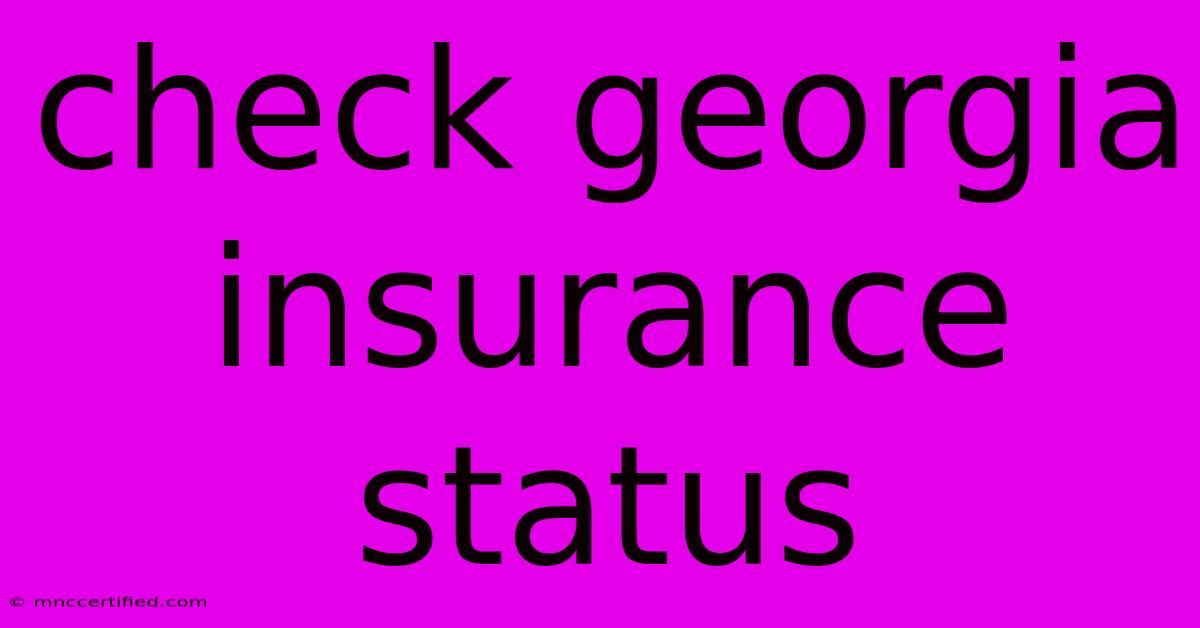Check Georgia Insurance Status

Table of Contents
How to Check Georgia Insurance Status: A Comprehensive Guide
Verifying the insurance status of individuals or businesses in Georgia is crucial for various reasons, from ensuring compliance before conducting business to confirming coverage after an accident. This comprehensive guide provides a step-by-step approach to checking Georgia insurance status effectively and efficiently. We'll cover different methods, common challenges, and important considerations.
Understanding Georgia's Insurance Verification System
Georgia doesn't have a single, centralized online database readily accessible to the public for checking insurance status. Access to this information is often restricted to authorized parties due to privacy concerns. Therefore, the methods for checking insurance status vary depending on your specific needs and the type of insurance you're investigating.
Key Considerations Before You Begin
- Purpose of Verification: Knowing why you need to verify insurance status is crucial. Different situations require different approaches.
- Type of Insurance: Are you checking auto insurance, professional liability insurance, workers' compensation insurance, or another type? The method of verification may vary depending on the type of insurance.
- Legal Compliance: Be aware of any legal restrictions or requirements related to accessing and using insurance information. Unauthorized access can have serious consequences.
Methods to Check Georgia Insurance Status
While a public online portal doesn't exist, several methods can help you verify insurance in Georgia:
1. Contacting the Insurance Company Directly
This is perhaps the most straightforward method. If you know the insurance company and the policyholder's name, you can contact them directly. However, due to privacy laws, they may only confirm whether a policy exists, without revealing specific policy details. Be prepared to provide identification and explain the reason for your inquiry. This method works best when you have a pre-existing relationship with the insured or need to confirm a specific policy detail.
2. Requesting Verification from the Insured Party
The simplest and most ethical way is to directly ask the individual or business for proof of insurance. This can be in the form of an insurance ID card or a certificate of insurance (COI). This method is reliable, avoids privacy concerns, and is often sufficient for most purposes.
3. Utilizing Legal Processes (For Specific Circumstances)
In certain situations, such as legal proceedings or investigations, you might need to utilize legal channels to obtain insurance information. This typically involves court orders or subpoenas. This should only be undertaken with the guidance of legal counsel.
4. Working with a Licensed Insurance Agent
Licensed insurance agents in Georgia have access to various databases and resources that may aid in verifying insurance information. While they may not provide direct access to sensitive policy details, they can potentially assist with confirming coverage through official channels.
Common Challenges and Solutions
- Privacy Concerns: Georgia’s strict privacy laws limit public access to insurance information. Always respect these laws and only access information you are legally entitled to.
- Lack of Centralized Database: The absence of a public database makes the verification process more time-consuming. Be prepared to use multiple methods.
- Inaccurate Information: Always verify information from multiple sources whenever possible to ensure accuracy.
Best Practices for Ensuring Accurate Information
- Maintain Clear Records: Keep detailed records of all communication and documentation related to insurance verification.
- Seek Legal Counsel When Necessary: If you encounter legal obstacles or require assistance with legally obtaining insurance information, consult an attorney.
- Prioritize Ethical Practices: Always respect individual privacy and comply with all relevant laws and regulations.
By following these guidelines, you can effectively and ethically check Georgia insurance status, ensuring that you're compliant with the law and have the accurate information you need. Remember to prioritize ethical practices and legal compliance throughout the process.

Thank you for visiting our website wich cover about Check Georgia Insurance Status. We hope the information provided has been useful to you. Feel free to contact us if you have any questions or need further assistance. See you next time and dont miss to bookmark.
Featured Posts
-
Does Insurance Cover Sublocade
Nov 27, 2024
-
Whos Behind Viral Election Petition
Nov 27, 2024
-
I M A Celeb Richard Coles Story
Nov 27, 2024
-
Trumps Tariffs A Deeper Purpose
Nov 27, 2024
-
Force Placed Insurance Florida
Nov 27, 2024